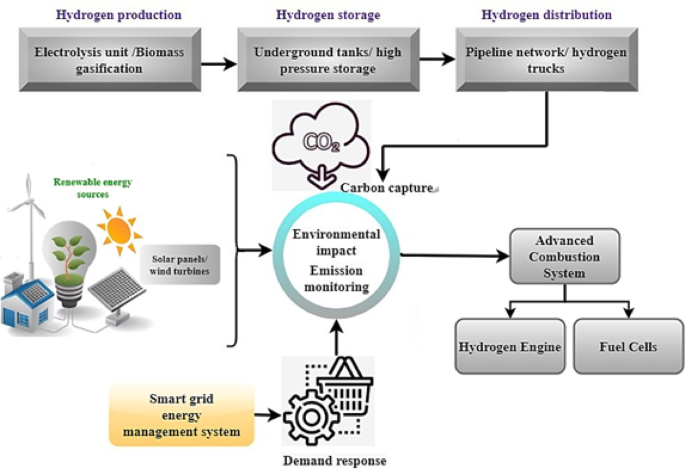Revolutionizing Energy Infrastructure: Optimizing Hydrogen Production Through Smart Grid Integration
Key Ideas
- Coordinating hydrogen production with smart grid dynamics enhances grid stability, flexibility, and renewable energy utilization.
- Improved combustion techniques coupled with smart grid technologies significantly reduce carbon emissions, addressing environmental sustainability concerns.
- Hydrogen integration in smart grids supports energy industry evolution, promoting infrastructure dependability and efficiency.
- The SGHE-CS innovation optimizes electrolyzer output, hydrogen storage, and combustion through artificial intelligence, enhancing grid stability and energy adaptability.
The article discusses the integration of smart grid interactions, hydrogen's potential, and improved combustion technologies to achieve a sustainable and resilient energy future. Coordinating hydrogen production with smart grid dynamics helps enhance grid stability, flexibility, and maximize renewable energy sources, addressing the challenges of energy intermittency. Improved combustion techniques, combined with smart grid technologies, play a crucial role in lowering carbon emissions and improving environmental sustainability. The integration of hydrogen in smart grids supports the evolution of the energy industry by enhancing infrastructure dependability and efficiency. The article emphasizes the importance of revealing hydrogen's potential in conjunction with smart grid integration for a more sustainable, flexible, and economically feasible energy system.
The research proposes the SGHE-CS, a revolutionary approach that integrates electrolysis, hydrogen storage, and combustion on a single platform using artificial intelligence to optimize energy production. This system autonomously adjusts electrolyzer output and combustion engine fuel blending based on real-time grid dynamics and demand forecasting, thereby maximizing round-trip efficiency and minimizing carbon emissions. Additionally, the article highlights the benefits of employing sophisticated ceramic-coated catalysts in combustion units operating on hydrogen-rich mixtures, reducing startup and shutdown times.
The article stresses the need for experts in hydrogen technologies, combustion, and smart grids to collaborate and provide integrated solutions to the challenges of combining these technologies. The complex problems of synchronizing hydrogen generation with changing energy use and matching hydrogen synthesis with renewable energy availability are discussed. The article also addresses the necessity of resilient grid systems to control hydrogen integration effectively and ensure stability. It concludes by emphasizing the importance of finding economically viable solutions to implement these advanced techniques for a sustainable energy future.
Topics
Power
Renewable Energy
Innovation
Energy Infrastructure
Economic Development
Environmental Sustainability
Smart Grid
Grid Stability
Combustion Technologies
Latest News
